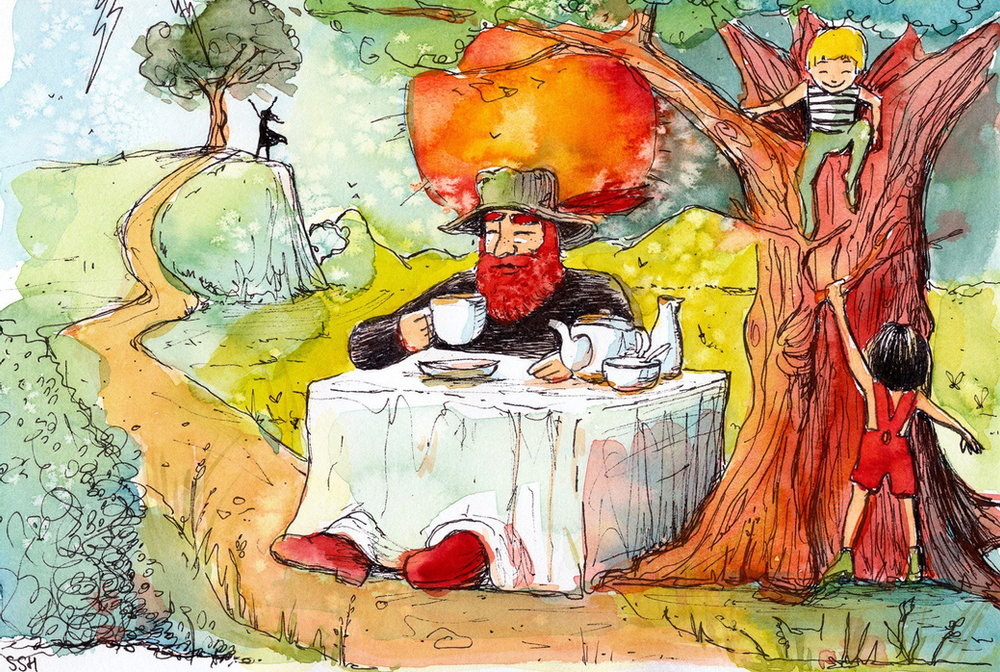In 2014, Yusuf played a 15-minute set for NPR’s famous ‘Tiny Desk Concert’ series. Bob Boilen, the creator of the show, broke from tradition to present an introduction on his guest. At the age of 17 in the early 70s, the first purchase Boilen ever made was a guitar. He learned the song ‘Father & Son’, and it brought him to tears. Fifty years later, Boilen has a son of his own, and the duality of the song’s verses is all the more touching.
https://www.youtube.com/watch?v=FoPoI1IwcTw
To anyone who grew up listening to Yusuf’s music, who was known as Cat Stevens for much of his career, Boilen’s story is immediately poignant. Before Bluetooth speakers and Spotify streams, my father had an infuriatingly buggy CD player and a select collection of artists from the 60s and 70s. Amongst the assortment of box sets, one particular piece grabbed the attention of my then ten-year-old self – a quaintly painted blue cover labelled ‘Tea for the Tillerman’. It brought my impatience to a halt. For the first time, I listened raptly to each song without any desire to skip tracks or change CDs. Although I was much younger than Boilen, it moved me immensely.
Much like Yusuf’s own journey, ‘Tea for the Tillerman’ is a project in constant search for spiritual and societal meaning. Like many artistic masterpieces, a personal tragedy inspired the album. In 1968, a bout of tuberculosis left Yusuf fighting for his life at just 20. An extended period of convalescence led him to introspect – questioning aspects of his own life, as well as more profound spiritual ones. Describing the experience, he said:
“The greatest thing that happened to me was when I realised I wasn’t the only person in the world. The thing I really wanted to do was to understand people and to put myself second. Then I realised that the only way to do that was to understand myself and then other people would understand me.”
He began to write more and more, opting for plaintive and personal topics built on disarmingly simple instrumentals. This shift would be foundational in writing ‘Tea for the Tillerman’. Featuring guitar and piano work described as “amateurish” by critiques, the avowed simplicity that the album operates on is its most vital selling point. The project propelled Yusuf (as Cat Stevens) to international stardom.
On its golden anniversary, the same dilemmas that he pondered over in 1970 seem more relevant than ever.
“I know we’ve come a long way/We’re changing day to day/But tell me, where do the children play?” sounds eerily prophetic today. Backed by lullaby-esque strumming, Yusuf offered caution on the increasing corporatisation and development he saw around him. He recognised not just the environmental cost of fast-tracked progress, but also the societal cost. Themes of growing up continue through the album. In ‘But I Might Die Tonight’, he shares a bitterness towards societies expectations on children. “I don’t want to work away/Doing just what they all say/Work hard boy, and you’ll find/Job-like mine, job like mine, a job like mine” is a sentiment that any student growing up with overbearing parents can share.
Although many listeners wrote off ‘Wild World’ as a breakup song written for actress Patti D’Arbanville, Yusuf clarified that he wrote the song about a personal search for peace in the frantic world around him. There’s a naivety to the track that romanticises the wistfulness associated with leaving a place, person, or time. This search for some form of meaning or enlightenment is constant in the project. On ‘Into White’ and ‘Miles From Nowhere’ Yusuf paints detailed pictures of isolation where he finds refuge from the constraints society imposes on him. While the latter adopts a more jubilant tone, the former has a moroseness to it – an evocative and vivid construction of a house that stands immersed in the blank nature around it.
The longest song on the album, ‘On The Road To Find Out’, perhaps best captures Yusuf’s career. Here, he bemoans the pitfalls of his relentless search for meaning, choosing instead to accept the spontaneity of the journey. As he puts it, “The seconds tick the time out/There’s so much left to know/And I’m on the road to find out”.
And of course, there’s ‘Father & Son’. With such balanced maturity, it makes you question how a 21-year-old could ever imagine let alone compose such a nuanced discussion between a father and son. The song is sung in two different registers to differentiate the two characters. The father calmly tries to convince his son not to fall prey to youthful waywardness, suggesting that he instead settles down. The son soliloquises, lamenting that his father never tries to understand his aspirations. In the end, the son decides that the time has finally come for him to break away. While the father fears for him, he knows that he has no choice but to let him carve his own path. Poetic, theatrical, and musical all at once.
In a stop-start career that has spanned over half a century, Yusuf’s quest for meaning has impacted millions across border, faith, and creed. Six months after its release on November 23, 1970, ‘Tea for the Tillerman’ had sold half a million copies. Cat Stevens was an international superstar.
But, after eight years at the top, he abandoned it all. The folk icon refrained from performing for nearly two decades, choosing instead to focus on his newfound faith. It wasn’t until 2004, on the encouragement of his son, that he resumed recording and performing non-religious music. Much like the rest of us, he has always been on the road to find out.
The original version of this article was posted in Livewire on November 23rd 2020.

